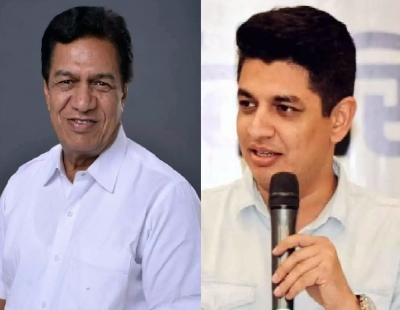Maharashtra
Maharashtra Congress jolted as MLC nominee withdraws, foists son as ‘Independent’ candidate

In a huge embarrassment for the Congress, Sudhir Tambe, the party’s official candidate for the January 30 biennial elections to the Maharashtra Legislative Council (MLC) for Nashik Division Graduates’ constituency, backed out of the race here on Thursday.
Instead, his son Satyajeet Tambe has filed his nomination as an Independent candidate, saying he will seek support from all the parties, including the Bharatiya Janata Party (BJP), and meet Deputy Chief Minister Devendra Fadnavis soon, though the latter has not committed anything.
“I have decided to step back in favour of youthful leadership of my son,” Sudhir Tambe told mediapersons, amid speculations that the father-son duo may switch loyalties to the BJP.
Tambe’s abrupt decision took the Congress by shock and rekindled memories of the rude political setbacks that the party had suffered during the MLC bypolls in June 2022, followed by the collapse of the Maha Vikas Aghadi government.
The top state and central leaders of the Congress were at total loss to comment on the developments with state Congress chief Nana Patole claiming that he is yet to get a full report as to what exactly transpired and how the official nominee did not file his papers as directed.
“We are trying to get the full information from our senior leaders in Nashik, including Congress Legislative Party leader Balasaheb Thorat, the local party unit and others,” said Patole.
The party’s chief spokesperson, Atul Londhe, said that they had no idea what transpired in the Tambe family, but Sudhir Tambhe has contacted neither the state or the Central leadership of the Congress so far.
The Tambe father-son duo rattled the party hours after Congress President Mallikarjun Kharge formally announced Sudhir Tambe’s candidature. He would have contested for the third time had he not backed out of the race.
Now, there are indications that the party may crack the whip on Tambe in the form of disciplinary action for disregarding Kharge’s directives.
Some leaders are also wondering if all this transpired due to any pressure or external influence, or was a well-planned political conspiracy.
The fast-paced happenings took place a day after the opposition Maha Vikas Aghadi staged a show of unity for the biennial polls to five MLC seats to be held on January 30.
Besides Patole, the meeting was attended by Nationalist Congress Party (NCP) President Jayant Patil, Shiv Sena (UBT) President Uddhav Thackeray and other senior leaders from the three alliance partners.
The five MLC seats comprise three from Teachers’ constituencies and two from Graduates’ constituencies, and the MVA had expressed confidence that it will bag all the five by giving ‘one-to-one fight’ to the ruling BJP-Balasahebanchi Shiv Sena (BSS) combine.
Unaware of what was in store after 24 hours, the Congress had displayed a large heart by deciding to give the Nagpur Teachers’ constituency seat to Sena (UBT).
The Congress would contest the Nashik and Amravati Graduates’ constituencies, currently held by BJP’s Ranjit Patil, who has been re-nominated.
The NCP will contest the Aurangabad Teachers’ constituency for which it has nominated sitting MLC Vikram Kale, while MVA ally, Peasants & Workers Party, will contest the Konkan Teachers’ constituency repeating its sitting MLC Balaram Patil.
Maharashtra
Milind’s gangsters are a symbol of the city’s destruction, action is being taken under MPDA

Mumbai: Milind Police have taken action against Tek Shankar Dhotre, who created terror here by intimidating shopkeepers, passers-by and rickshaw drivers and collected money by threatening them. The action has been taken on the instructions of Additional Commissioner Mahesh Patil. The accused is a terror in the area. A total of 6 cases of violence against him have been registered against him for collecting money. He intimidates traders and shopkeepers and collects money from him every month. No one used to speak out against him. In such a situation, the police took the complainant into confidence and took action against him. He is a terror in Milind. After taking action under the MPDA, the accused was taken into custody and deported from Mumbai to other cities. The Mumbai Police has now started action against such goons to restore the trust of the public towards the police so that the public’s trust in the police is established and the fear of the police remains in the hearts of the goons.
Maharashtra
Mumbai Weather Update: City Continues To See Smog-Filled Morning Amid Rising Pollution; Overall AQI Remains In Unhealthy Range At 281

WETHER
Mumbai: Mumbai began its Friday with a deceptively pleasant chill, as minimum temperatures dipped just below 22°C, offering residents a brief sense of relief. However, this early coolness quickly gave way to discomfort as people stepped outside to find the city blanketed in a dense, lingering smog. Commuters heading out during peak morning hours encountered reduced visibility along with eye irritation, throat discomfort and difficulty breathing, clear signs of an atmosphere overloaded with pollutants.
What initially felt like a refreshing morning soon became yet another stark indicator of Mumbai’s steadily worsening air-quality crisis. A thick haze settled over major roads, residential complexes, commercial hubs and transit routes. With only weak winds sweeping across the region, there was little natural movement to disperse the pollutants that have been steadily accumulating throughout November.
The India Meteorological Department (IMD) reported that the city is expected to experience clear skies through the day, with temperatures likely climbing to around 33°C in the afternoon. While the mild morning chill is expected to persist over the next few days, experts noted that there is still no sign of when Mumbai’s air quality might improve. The stagnant atmospheric conditions continue to trap particulate matter close to the surface, aggravating the city’s pollution load.
On Friday, Mumbai’s overall Air Quality Index (AQI) rose to a worrying 281, placing it firmly in the unhealthy category. This spike represents a major deterioration from earlier in the month, when several neighbourhoods reported moderate or merely poor readings. The decline is now citywide, affecting coastal stretches, industrial belts and densely populated residential areas alike.
Among the worst-affected locations, the Wadala Truck Terminal recorded an alarming AQI of 395, marking it as the most polluted spot of the day. Colaba followed with a reading of 317, while Chakala reported 310, both falling within the severe category.
Prominent business zones were not spared either: Worli and the Bandra-Kurla Complex (BKC) each logged AQI levels of 310, showing how uniformly pollution has spread across Mumbai’s central, western and eastern sectors.
Some suburbs fared marginally better but still failed to reach healthy levels. Kandivali East recorded the day’s lowest AQI at 130, classified as poor. Powai stood at 200, Malad West at 210, Parel Bhoiwada at 220, and Mulund West at 237, placing all within the poor to unhealthy range.
For context, an AQI of 0–50 is considered good, 51–100 moderate, 101–150 poor, 151–200 unhealthy, and anything above 200 classified as severe or hazardous. With much of the city now above that threshold, Mumbai continues to grapple with an air-quality crisis that shows no signs of easing.
Maharashtra
Mumbai: Massive Fire Breaks Out Inside Godown In Kurla’s Kismat Nagar;

Mumbai: A major fire erupted inside a godown in Kurla West’s Kismat Nagar area on Thursday night, triggering a swift response from the Mumbai Fire Department. Videos circulating on social media showed towering flames accompanied by dense black smoke rising high above the godown, visible from several hundred metres away.
According to officials, the Brihanmumbai Municipal Corporation (BMC) Fire Brigade received an emergency call at 11:08 pm, following which multiple fire tenders were rushed to the spot. Initial assessments categorised the blaze as a Level-II fire, but as flames rapidly spread across adjoining structures, the situation escalated. By 11:44 pm, the Mumbai Fire Brigade declared it a Level-III (major) fire after the inferno engulfed nearly 10 to 12 chawl structures.
Firefighters battled the spreading flames through the night, working to prevent the blaze from reaching densely packed residential units in the vicinity. The godown where the fire originated was located within a chawl cluster, making containment especially challenging. Thick plumes of smoke blanketed surrounding localities as emergency teams attempted to bring the situation under control.
Several agencies were deployed as part of the coordinated response effort, including the BMC Fire Brigade, local police, ward officials, the Electricity Distribution Company and a 108 ambulance unit. Despite the scale of the fire and the proximity to residential structures, authorities reported no injuries so far. The cause of the blaze remains under investigation.
Meanwhile, in a separate incident late Wednesday night, a car fire on the Bandra Worli Sea Link caused major disruption to traffic. The vehicle, identified as a Honda sedan, reportedly rammed into the side barrier at high speed before catching fire. Motorists on the busy sea link were left stranded as a long traffic snarl developed, with many unsure of the cause until videos began circulating online.
Footage showed the vehicle completely charred, with firefighters working quickly to extinguish the flames. Though the fire generated thick smoke and intense heat, no casualties have been confirmed. Fire officials later stated that the blaze was brought under control after brief yet intense firefighting efforts.
-

 Crime3 years ago
Crime3 years agoClass 10 student jumps to death in Jaipur
-

 Maharashtra1 year ago
Maharashtra1 year agoMumbai Local Train Update: Central Railway’s New Timetable Comes Into Effect; Check Full List Of Revised Timings & Stations
-

 Maharashtra1 year ago
Maharashtra1 year agoMumbai To Go Toll-Free Tonight! Maharashtra Govt Announces Complete Toll Waiver For Light Motor Vehicles At All 5 Entry Points Of City
-

 Maharashtra1 year ago
Maharashtra1 year agoFalse photo of Imtiaz Jaleel’s rally, exposing the fooling conspiracy
-

 National News1 year ago
National News1 year agoMinistry of Railways rolls out Special Drive 4.0 with focus on digitisation, cleanliness, inclusiveness and grievance redressal
-

 Maharashtra1 year ago
Maharashtra1 year agoMaharashtra Elections 2024: Mumbai Metro & BEST Services Extended Till Midnight On Voting Day
-

 National News1 year ago
National News1 year agoJ&K: 4 Jawans Killed, 28 Injured After Bus Carrying BSF Personnel For Poll Duty Falls Into Gorge In Budgam; Terrifying Visuals Surface
-

 Crime1 year ago
Crime1 year agoBaba Siddique Murder: Mumbai Police Unable To Get Lawrence Bishnoi Custody Due To Home Ministry Order, Says Report












